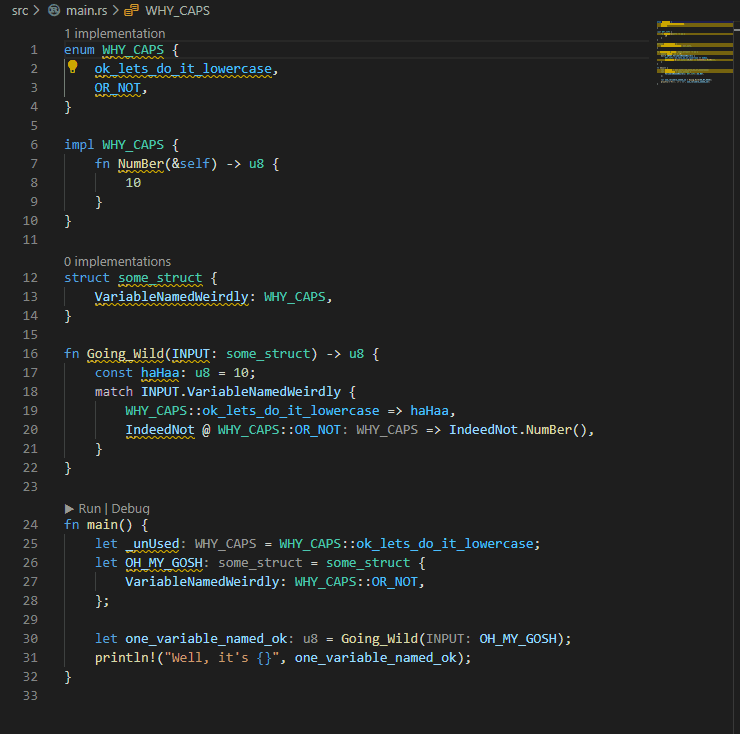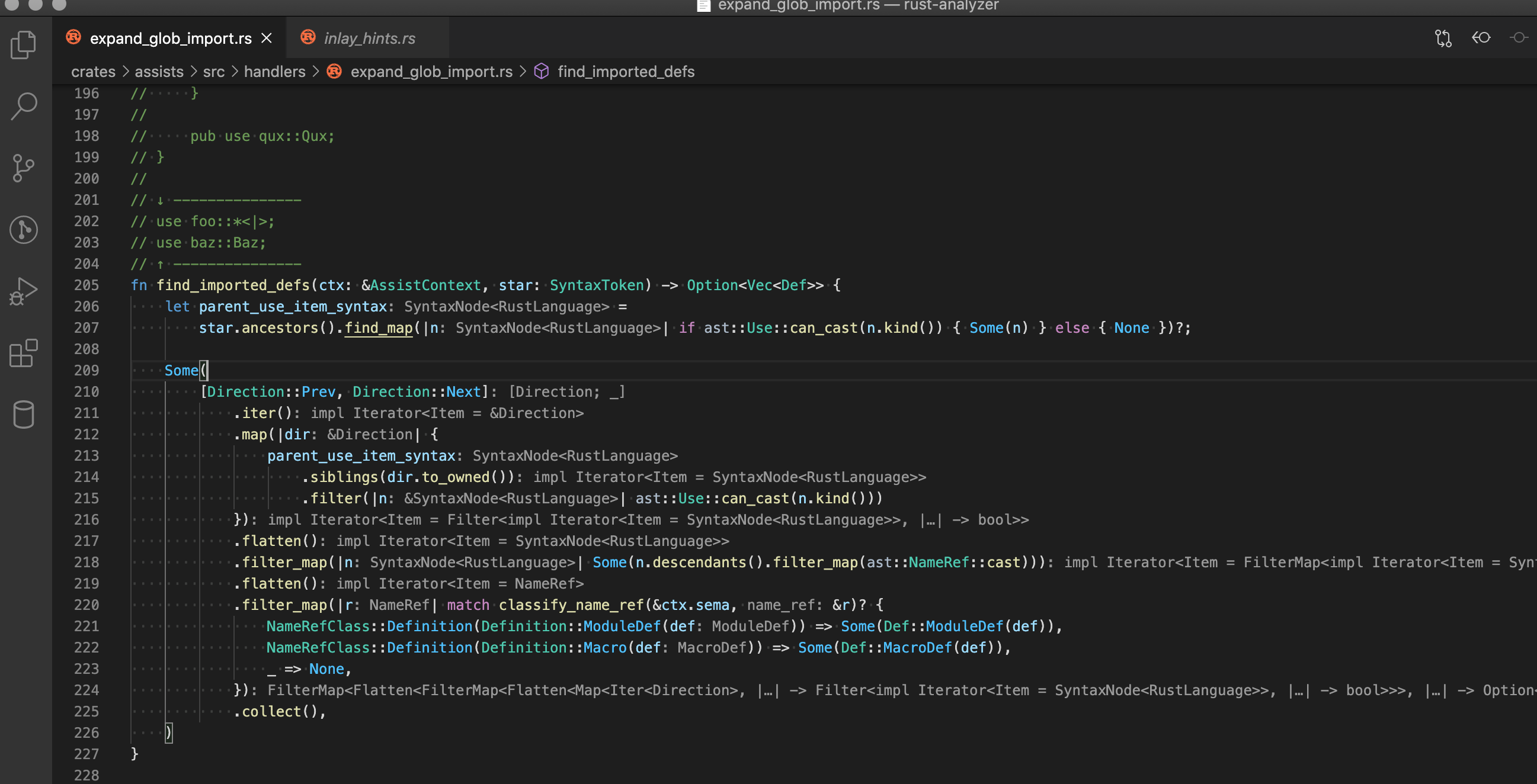| Commit message (Collapse) | Author | Age | Files | Lines |
|---|
| ... | |
| | | | |
|
| | |/
|/| |
|
| | | |
|
| |/
|
|
|
|
|
|
| |
Declaration names sounds like a name of declaration -- something you
can use for analysis. It empathically isn't, and is just a label
displayed in various UI. It's important not to confuse the two, least
we accidentally mix semantics with UI (I believe, there's already a
case of this in the FamousDefs at least).
|
| |\ \
| | |
| | |
| | |
| | |
| | |
| | |
| | |
| | |
| | |
| | |
| | |
| | |
| | |
| | |
| | |
| | |
| | |
| | |
| | |
| | |
| | |
| | |
| | |
| | |
| | |
| | |
| | |
| | |
| | |
| | |
| | |
| | |
| | |
| | |
| | |
| | |
| | |
| | |
| | |
| | |
| | |
| | |
| | | |
6130: Items case quick fix (snake_case / UPPER_SNAKE_CASE / CamelCase) r=matklad a=popzxc
Resolves #4598.
After a third try, it finally works. Boy, it appeared tougher than it seemed.
Initially I thought like "Ha, `rustc` already tells us where idents are named incorrectly. It shouldn't be that hard, should it?".
Well, the problems with the information provided by `rustc` appeared shortly:
- `rustc` warnings are `flycheck` warnings, which are slightly aside from our diagnostics with fixes.
When we map flycheck diagnostic to LSP, we can convert it into a fix, but only if it's marked as `Applicability::MachineApplicable`.
Name case fix is marked `Applicability::MaybeIncorrect`, and for a reason: it only suggest to rename symbol under cursor, without tracking any references.
- Warning spawned by `rustc` are identified by string labels rather than enum. It means that if one day the diagnostic will be renamed in `rustc`, `rust-analyzer` code will still compile, but won't find the required diagnostic by name anymore. If by chance this will happen when some unlucky guy will decide to create their first pull request, they'll be confused by suddenly failing tests (likely) not related to their changes.
- Even if we'll try to build fixes atop of `rustc` warnings, we'll have to do it in the `rust_analyzer::diagnostics::to_proto` module, which is far less
convenient for that matter than `ide` crate.
That's why I decided that it's worth a separate `rust-analyzer` diagnostic, which will implement `DiagnosticWithFix` trait.
After that, I discovered that currently `hir_ty::diagnostics` only check `DefWithBody` types, like function bodies. I had to add support for diagnostics
which look at any `ModuleDef`.
And of course, since I'd added a lot of new functionality, it required extensive testing.
That explains why the diff is so big for a (looking) relatively small feature.
I hope that this PR doesn't only add a small feature, but also creates a base for building another features.
## Example:

P.S. My eyes were bleeding when I had to write the code for the example...
6135: when generating new function, focus on return type instead of body r=matklad a=bnjjj
I made a little change when we use the assist to generate a new function, instead of focusing on the function body, it will focus on return type
Co-authored-by: Igor Aleksanov <[email protected]>
Co-authored-by: Benjamin Coenen <[email protected]>
|
| | | | |
|
| | | | |
|
| | | |
| | |
| | |
| | | |
check
|
| |\ \ \
| |/ /
|/| |
| | |
| | |
| | |
| | |
| | |
| | |
| | |
| | |
| | |
| | |
| | |
| | | |
6195: Shorten iterators in associated params r=matklad a=SomeoneToIgnore
Applies the same iterator-shortening logic to the iterator associated types, recursively.
Before:

After:
<img width="1192" alt="image" src="https://user-images.githubusercontent.com/2690773/95662894-e9038080-0b42-11eb-897d-527571ccac58.png">
Co-authored-by: Kirill Bulatov <[email protected]>
|
| | |/ |
|
| | | |
|
| | | |
|
| | |
| |
| |
| | |
IMO this is too much work to be worth fixing at the moment.
|
| | |
| |
| |
| |
| |
| |
| |
| |
| | |
Currently a method only has defaultness if it is a provided trait
method, but this will change when specialisation is available and may
need to become a concept known to hir.
I opted to go for a 'fewest changes' approach given specialisation is
still under development.
|
| |/ |
|
| | |
|
| |\
| |
| |
| |
| |
| |
| |
| |
| |
| |
| |
| | |
6124: Better normalized crate name usage r=jonas-schievink a=SomeoneToIgnore
Closes https://github.com/rust-analyzer/rust-analyzer/issues/5343
Closes https://github.com/rust-analyzer/rust-analyzer/issues/5932
Uses normalized name for code snippets (to be able to test the fix), hover messages and documentation rewrite links (are there any tests for those?).
Also renamed the field to better resemble the semantics.
Co-authored-by: Kirill Bulatov <[email protected]>
|
| | | |
|
| | | |
|
| | | |
|
| |/ |
|
| | |
|
| | |
|
| |\
| |
| |
| |
| |
| |
| |
| |
| |
| |
| |
| |
| |
| |
| |
| |
| | |
5846: Add references to fn args during completion r=matklad a=adamrk
When completing a function call, if there is an argument taken as a ref or mut ref which matches the name and type of a variable in scope, we will insert a `&` or `&mut` when filling in the function arguments. This addresses https://github.com/rust-analyzer/rust-analyzer/issues/5449.
E.g.
```rust
fn foo(x: &i32) {}
fn main() {
let x = 5;
foo # completing foo here generates `foo(&x)` now instead of `foo(x)`
}
```
Co-authored-by: adamrk <[email protected]>
|
| | | |
|
| | | |
|
| | | |
|
| | |
| |
| |
| |
| | |
It handles fn-like macros too, and will handle attribute macros in the
future
|
| | | |
|
| |/ |
|
| |
|
|
|
|
|
|
|
|
|
|
| |
`hir` should know nothing about URLs, markdown and html. It should
only be able to:
* resolve stringy path from documentation
* generate canonical stringy path for a def
In contrast, link rewriting should not care about semantics of paths
and names resolution, and should be concern only with text mangling
bits.
|
| | |
|
| | |
|
| |
|
|
|
| |
Doc comments *are* attributes, so there's no reason to have two crates
here.
|
| | |
|
| | |
|
| | |
|
| | |
|
| |
|
|
|
| |
We generally shouldn't expose TypeRef out of hir. So, let's just use a
placehoder here.
|
| | |
|
| |
|
|
| |
`consuming`.
|
| |
|
|
|
|
|
|
|
|
|
|
|
|
| |
Conjecture: it's impossible to use hir::Path *correctly* from an IDE.
I am not entirely sure about this, and we might need to add it back at
some point, but I have to arguments that convince me that we probably
won't:
* `hir::Path` has to know about hygiene, which an IDE can't set up
properly.
* `hir::Path` lacks identity, but you actually have to know identity
to resolve it correctly
|
| | |
|
| |
|
